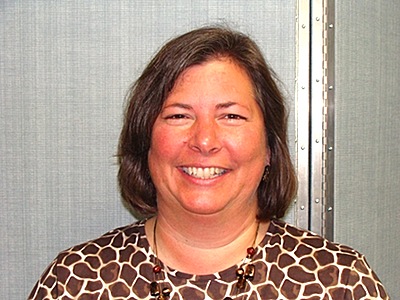- By Dan Veaner
- Around Town
 Print
Print  Christine Rebera became the principal of Lansing's R.C. Buckley Elementary School last week by a unanimous vote of the school board. Rebera has been Acting Principal for the past year, filling the position Chris Pettograsso left vacant when she was made Acting Superintendent. When Pettograsso was hired as permanent Superintendent it officially left an opening in the elementary school. Rebera rose to the top of a pool of 61 applicants and was officially hired by the Board Of Education at its July 8th school board meeting.
Christine Rebera became the principal of Lansing's R.C. Buckley Elementary School last week by a unanimous vote of the school board. Rebera has been Acting Principal for the past year, filling the position Chris Pettograsso left vacant when she was made Acting Superintendent. When Pettograsso was hired as permanent Superintendent it officially left an opening in the elementary school. Rebera rose to the top of a pool of 61 applicants and was officially hired by the Board Of Education at its July 8th school board meeting.Rebera studied Interdisciplinary Studies with a focus in community education with a minor in social work at Miami University in Ohio. She worked in human services in Minnesota for about five years before moving to the Ithaca area where she became Program Director at the Community School of Music and Arts, working with faculty and staff and organizing programs. She got her teaching certification at Elmira College and a Masters in Reading Education.
She was hired at the Lansing elementary school as a substitute teaching first grade, then fourth grade for a semester, then second grade, which she taught for ten years. She earned her administrative certification at SUNY Cortland. She interned in Lansing , working with then Principal Chris Pettograsso at the elementary level and in curriculum instruction. After earning that certification she became the Lansing/Groton Teacher Center Director, working with faculty on professional development, as well as subbing for administrators. She met with the Lansing Star last Friday to talk about what the community can expect in her school in the future.
Lansing Star: When you went for your administrative certification was this the goal, to become a principal?
In some ways it was lucky that the perfect job opened at the right time.
Even so the board ran you through the gamut like any other candidate, right?
What's going to be different now that 'Acting' has been taken away? When you're 'Acting' you don't want to make major shifts because you are care-taking for the person who is expected to come back. Now you are more able to have your own leadership initiatives.
That work wil continue. I will continue to support all of those things and make great things happen with the kids.
You've worked with this faculty for a very long time in three different roles, as a member of the faculty, as Teacher Center Director, and as Principal.
I have worked to develop relationships in the school and the community over the years. My role as Teacher Center Director gave me a chance to bridge that gap, or make that leap -- whatever we were doing while we were transitioning with these new state mandates. I was able to get the training and work closely with the teachers so we could move forward together.
It's been great for me because I've been part of the development of some of those things. For example, the teacher evaluation system (APPR). I've been on the committee and helped develop (local procedures). So now when I have to implement it, there is a smooth transition.
 Christine Rebera
Christine ReberaComing from within the school system, does that help or hurt? Because if you come in new you have a new set of eyes seeing things with a fresh perspective. But coming from within the district you have already built relationships and are already up to speed on district procedures and its culture.
Also, my role as Teacher Center Director had me in a lot of places with a lot of people across the state. So I can see how other schools and districts are handling things, what other ideas they have and how it went, and use some of those ideas to either implement or evaluate what we're doing. I feel that's been helpful.
As an administrator you don't have that every day classroom connection to children. Are you going to be able to maintain that kind of connection to kids?
The other piece is that I am in touch with the needs of the students on a larger scale. So when teachers and students are working together on a particular goal, or a student has a particular need, sometimes I get involved because of my work in supporting students with a team of people. I feel I get to know a lot of the students and I have more ability to bring resources where they're needed and help teachers identify strategies to help.
So I get to have more students in a way. And have the impact. That's one of the reasons I like the idea of becoming an administrator -- because it would broaden my scope and give me a larger number of students I could make an impact with.
The other part of seeing students is discipline.
They have to learn how to be a good student and be a good citizen and what those roles are and where to push and where to give. I enjoy working with the students while they're going through those things, and with the parents. Sometimes things come up and I like to be right in communication with parents so we are looking at it in the same way so we can see what we can do to support their child.
There is a wide variety of behaviors. I think it's a really important role because you do develop relationships with the students in that way so they understand where the line is, where the boundaries are. Sometimes that is really what they need. So I provide that and the support that they need to make the right choices.
This must be a more nurturing environment because it's a smaller school.
I would say that the 'small' feeling that you have in the elementary building is because of the relationships that everybody develops. We're very relationship-focussed. The teachers, the aids, the staff and everyone here develops relationships with the students, and that's what really stands as one of the most important things you can do for kids. When they have those healthy relationships and school is a healthy place, they want to be in a happy place, they want to enjoy their school time and they want to do the right thing.
When you continue to build that sense of community and support for the students then the principal has to follow through on that and say, 'that's not how we do things here'. I'm able to say this is what we do in this community and the student, at this point, understands that because they have been hearing that same message in the classrooms and everywhere they go.
How do you do that in the face of the mandates? One of our principals left the profession because mandates are so onerous.
So I'm using the mandates and all the things they're coming down with to say we want it to be better. And we're saying we're already great and what can we use so that we can be better? Rather than thinking they are something that is taking us apart.
That's how I view it. That's how I've been approaching it with the faculty and staff. That's the way I will continue to do it.
When you do it that way I feel it gives everyone the confidence that you really believe in the school and what we stand for.
I know the mandates are very stressful for a lot of people across the state. There's no getting around that. Sometimes change is stressful. I think if we can take the parts of change that are good and see what it is that we could benefit from and incorporate that and not be as intimidated or stressed by the other parts of it, then we'll be doing really well. And I think we did really well for our first year of incorporating all of (the mandates) at the same time.
There are a lot of positive things that can come from the things that they are mandating. But everything was all at once. So I think that was the hard thing for everyone across the state to take on.
Do you have any big shifts in mind?
So we're supporting teachers for training and professional development where needed. We're giving them some time and resources to develop curriculum that continues to support the Common Core and enhance their teaching. I definitely want to focus on teaching strategies that will help teachers grow and help the students.
It's a good thing because it lets us focus in on that as a team. It will be exciting. I think everyone is feeling we were successful -- we got through that first year and we're excited to have a fresh start this year. We have that under our belts and now we can take it and run.
What are you most looking forward to going forward?
It's an exciting place to be. Elementary school is a happy place to be, and R.C. Buckley is an especially happy place. I look forward to working with everyone and making this year successful.
v9i27



